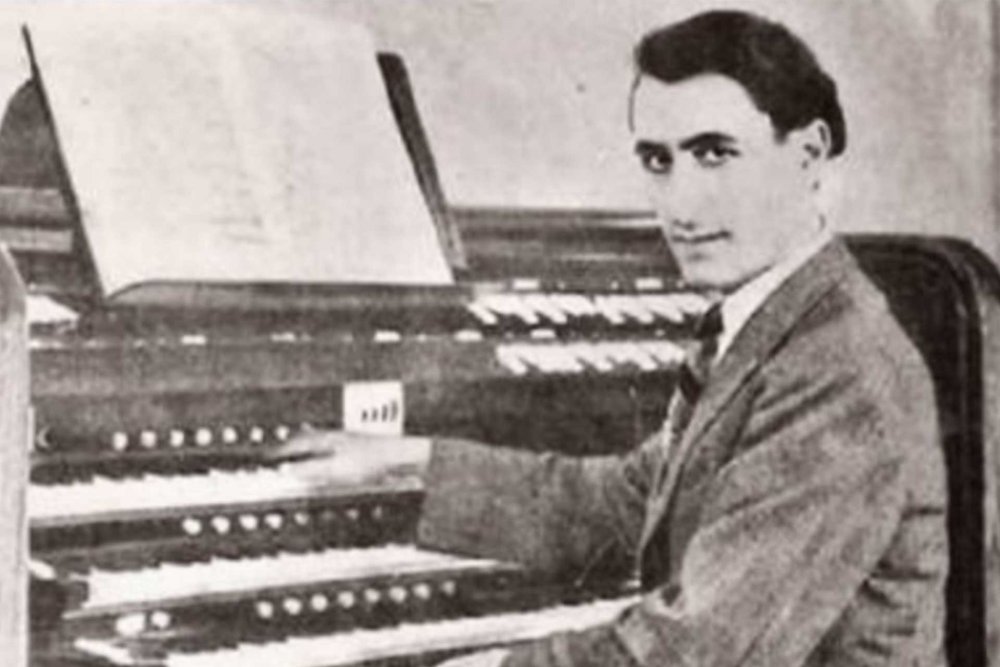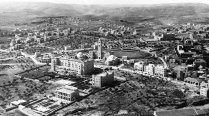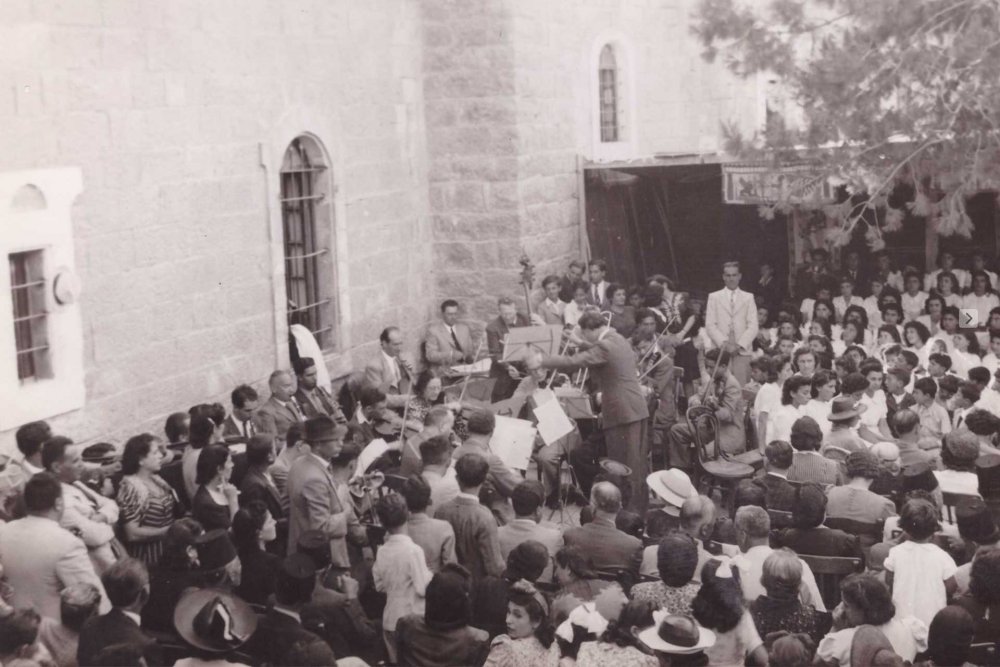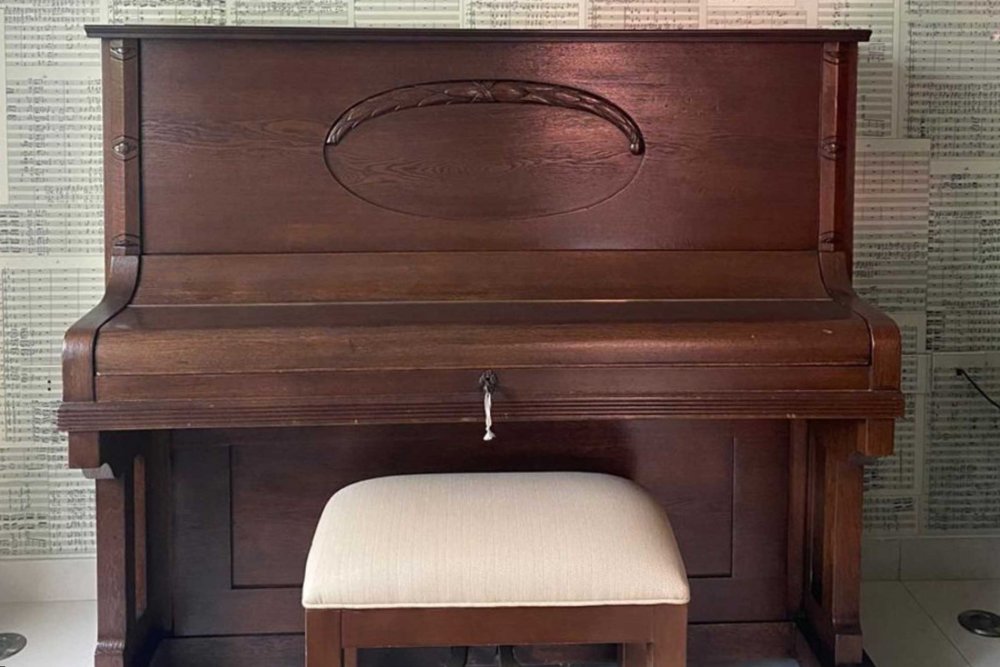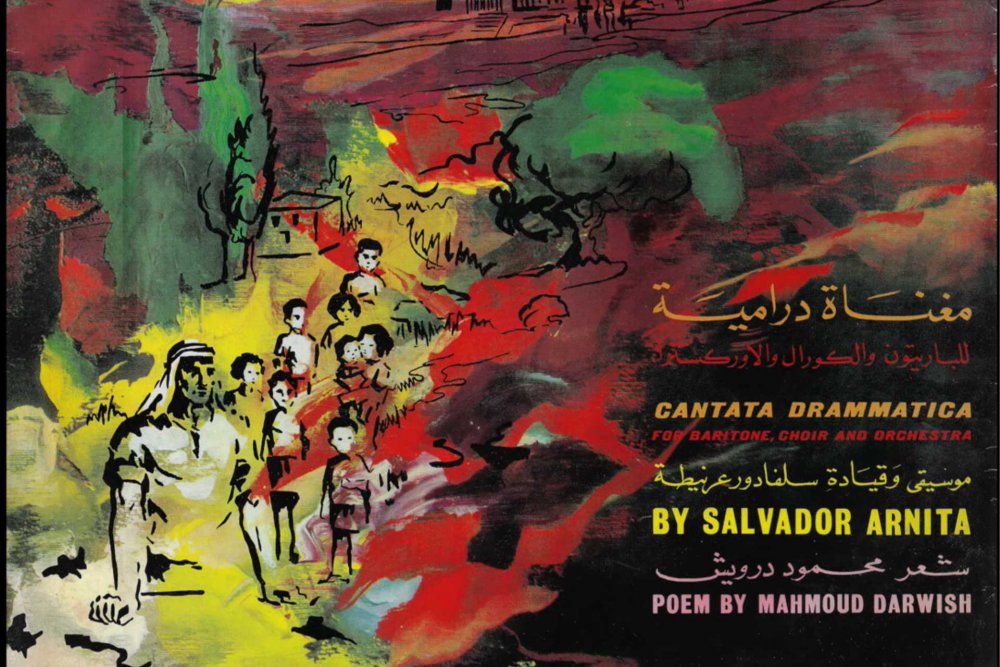Salvador ‘Arnita was a pioneer of the musical renaissance in Palestine and an exceptional classical music composer.
Childhood and Education
Salvador ‘Arnita was born on March 4, 1914, in Jerusalem. His musical journey began when he was only 11 years old and was quite promising from the start. He was taught by the legendary Augustine Lama, who was chief organist in all Catholic churches in the Holy Land and considered the most professional virtuoso of his time and called the “grandfather” of modern Palestinian music. ‘Arnita “was one of his most prolific students.”1
By the age of 13, ‘Arnita played the organ at the Church of the Holy Sepulchre in the Old City of Jerusalem. At the age of 16, he traveled to Alexandria, Egypt, where he became church organist and then choir conductor at the Roman Catholic cathedral of St. Catherine. Four years later, he was granted a scholarship to study music in Italy. He enrolled at the National Academy of Santa Cecilia in Rome, one of the oldest musical institutions in the world that originated in the Renaissance. Today, the academy graduates the most prominent musicians, with a symphony orchestra and chorus known and appreciated throughout the world. One year after graduating from this elite institution, ‘Arnita pursued his music studies at the Guildhall School of Music and Drama in London, where he also started teaching.
Back to Palestine: The YMCA, Birzeit, and Key Music Compositions
After finishing his studies abroad in 1936, aged only 20, ‘Arnita returned to Jerusalem and was appointed music director of the YMCA. He was also director of the Palestine Broadcasting Station Orchestra. He developed a unique style, combining traditional Arabic instruments such as the qanun, darbuka, and daff, while mixing in Palestinian folklore music.
The organ ‘Arnita played was the largest in the Middle East, with 3,600 pipes and a carillon tower. When he played the carillon (an instrument made of chimes) at Jerusalem’s Bell Tower, the music rang over the city to the awe of its residents. One of his former piano students at the YMCA describes the effect of watching him make music:
We were fascinated by the way he played the great pipe organ in the YMCA auditorium with both his hands and feet. And more so, when he played the carillon, which would ring the bells of the tower. I cannot think of Jerusalem without these lovely memories.2
‘Arnita continued as music director at the YMCA until 1948, and he also taught at Birzeit High School and College from 1939 to 1946.
Another former piano student of his describes the pivotal role he had at Birzeit High School and College:
His advanced musical training was reflected in his musical compositions of national songs which he wrote for choir and orchestra. During every graduation ceremony, a new song of his composition would be performed, most of which were national songs.3
At Birzeit College, he taught piano, trained the chorus, and wrote music compositions. He composed the school’s anthem, setting to music the lyrics of the school’s Arabic instructor Wadih Deeb, a renowned Lebanese poet. ‘Arnita conducted the choir in performing the anthem at public events and graduation ceremonies, and it is used to this day.
After the Nakba: Lebanon
‘Arnita married Yusra Jawhariyyeh, a renowned musicologist and the eldest daughter of well-known oud player and Palestinian Jerusalemite Wasif Jawhariyyeh, in 1947. During the 1948 War, they were forced into exile and moved to Lebanon (see The West Side Story). There, the couple taught music at the American University of Beirut (AUB), and ‘Arnita started a special music program at the university’s music department, which he also headed.
The dynamic couple had joint music projects. They composed an album for children titled Shadi and Shadiya, which includes songs and melodies for preschool, first, and second grade children. They wrote a guidebook for teachers of music with song explanations and piano notes.
‘Arnita was the director of the music department at AUB for 30 years; he retired in 1980. During his tenure, he taught various young pianists and composed most of his works. He expanded the choir and assembled a professional orchestra, and he also produced operettas and composed orchestral music. After his retirement at the age of 65, he and his wife moved to Jordan and spent their final years there.
Musical Achievements
It had been estimated that ‘Arnita composed well over 200 pieces throughout his life. These include three symphonies, four concerts for piano, organ, flute, and viola, two suites, 10 piano preludes, two piano sonatas, four organ preludes and fugues, two string quartets, as well as different sonatas, organ preludes, quartets and trios, and others.
‘Arnita drew not only on the traditional Arabic instruments but also on Palestinian folklore music in his compositions. To preserve these songs, ‘Arnita drew from research done by his wife, Yusra, a musicologist, who collected 100 Palestinian folk songs for the Research Center of the PLO.
In addition to composing Birzeit University’s anthem, he also composed a solemn hymn, “Centenarius,” commemorating the centenary of the founding of the AUB in 1966.
Among his well-esteemed compositions was the cantata “Identity,” based on the poem of Mahmoud Darwish, Sajjil Ana ‘Arabi (Write down: I am an Arab). This was written for a full symphony orchestra, with a choir of 74, and it is considered a hallmark contribution to the Palestinian national struggle.
According to an entry on the Facebook page PalMusicUK, the piece makes use of three Palestinian folk songs: the ice-cream vendor; the coffee maker; and the man with the plaited hair.4
In a column from al-Wahda newspaper (a nonpartisan weekly that was issued in Palestine between October 1945 and December 1947), a contributor by the name of Levon Keshishian writes in April 1946 how captivating it was to hear the great piano of the YMCA, and how surprised he had been to find out that the pianist with the name of Salvador was in fact an Arab from Jerusalem.5 Keshishian described the excellent compositions and orchestral pieces of ‘Arnita, which included a few choral works and chamber music. He describes how British broadcasts aired ‘Arnita’s music and how famous royal festivals including the Royal Albert Hall celebrated him. He also mentions how ‘Arnita performed as piano and organ soloist with the BBC Symphony Orchestra, the Rome Symphony Orchestra, the Boston Symphony, and several others in France, Belgium, Switzerland, and Budapest. He had worldwide tours and more than 100 concerts, both as solo musician and orchestra conductor. Kesheshian ends the column by concluding that “No man is a prophet in their own land,” insinuating that ‘Arnita may have been more appreciated abroad than in his hometown.
‘Arnita was a member of the international music composition as of 1955, the American Organists Association, and the International Folk Arts Council as of 1960.
In the summer of 1955, ‘Arnita was awarded a Rockefeller Fellowship to study in the United States.
In 1965, he won the first three awards in the second musical composition competition in Beirut’s Music Youth Association and in front of a jury consisting of members from Belgium, France, Spain, Poland, and Turkey. He also was awarded an honorary prize by King Leopold of Belgium.
In 1966, he conducted the Cairo Symphony Orchestra, the Berlin Symphony Orchestra, and the Torino Radio Orchestra. In 1969, he became a member of the American Association of University Professors.
‘Arnita toured many countries and performed in more than 100 concerts, either as a solo musician or as an orchestra conductor. He frequently performed at Harvard University and Massachusetts Institute of Technology in the US, as well as in several European cities. He conducted the Berlin Symphony Orchestra, the Pittsburgh Orchestra, the Boston Symphony Orchestra, and the orchestra at Tanglewood, among others. He also performed as piano or organ soloist with the BBC Symphony Orchestra, the Rome Symphony Orchestra, and the Boston Symphony.
A full catalog of materials related to Arnita’s life and work exists in the AUB Archives and Special Collections Department and can be accessed here.
Death, Legacy, and Awards
‘Arnita died of cancer on March 14, 1984, in Amman, Jordan.
In 2000, the Edward Said Conservatory of Music and Palestine Ministry of Culture launched a special event to celebrate the birthday of ‘Arnita at the Ramallah Culture Palace. To celebrate his centennial, the conservatory announced plans to publish his entire body of compositions, many of which are now available, either in print or electronically. Birzeit University also held a centennial celebration dedicated to him.
On March 3, 2014, President Mahmoud Abbas granted ‘Arnita’s family the Order of Culture, a medal of culture, arts, and sciences commending his creative contributions. The award was received by his daughter, Shadia Arnita Jacir, at the presidential headquarters in Ramallah.
Sources
Abu Nader, Iman Abdallah. “Salvador Arnita Collection, 1952-1980.” American University of Beirut/Library Archives. Accessed September 12, 2023.
Accademia Nazionale di Santa Cecilia. Accessed August 15, 2023.
“The Arab Palestinian Musician Salvador ‘Arnita.” [In Arabic.] Fusha, February 25, 2021.
“Augustine Lama.” All4Palestine. Accessed August 20, 2023.
Bakir, Hanan. “The Diaspora Scatters Creativity.” [In Arabic.] Falestinona, September 2, 2019.
“Cantata Dramatica (Identity Card).” Promised Lands. Accessed September 12, 2023.
Edward Said Conservatory of Music. “Publications.” Accessed September 12, 2023.
Giovetti, Olivia. “A Palestinian Composers Playlist: Musical Identities Made and Inherited.” Van Magazine, August 5, 2021.
“In Photos: The National Institute of Music Launches a Special Celebration in Honor of the Late Palestinian Musician Salvador ‘Arnita.” [In Arabic.] Radio Bethlehem, March 4, 2014.
Khoury, Samia Nasir. “Memories of Jerusalem.” This Week in Palestine, no. 289, May 2022.
“Salvador Arnita.” [In Arabic.] WAFA: Palestinian News & Info Agency. Accessed July 29, 2023.
Tarazi, Rima. “The Palestinian National Song: A Personal Testimony.” This Week in Palestine, no. 108, April 2007.
“Yusra Jawhariyyeh ‘Arnita.” [In Arabic.] al-Tibrah. Accessed August 27, 2023.
[Profile photo: The Palestinian Museum]
Notes
Olivia Giovetti, “A Palestinian Composers Playlist: Musical Identities Made and Inherited,” Van Magazine, August 5, 2021.
Samia Nasir Khoury, “Memories of Jerusalem,” This Week in Palestine, no. 289, May 2022, 47.
Rima Tarazi, “The Palestinian National Song: A Personal Testimony,” This Week in Palestine, no. 108, April 2007.
PalMusicUK, Facebook, June 20, 2020.
Al-Wahda newspaper, April 27, 1946, retrieved from “The Arab Palestinian Musician Salvador ‘Arnita” [in Arabic], Fusha, February 25, 2021.

